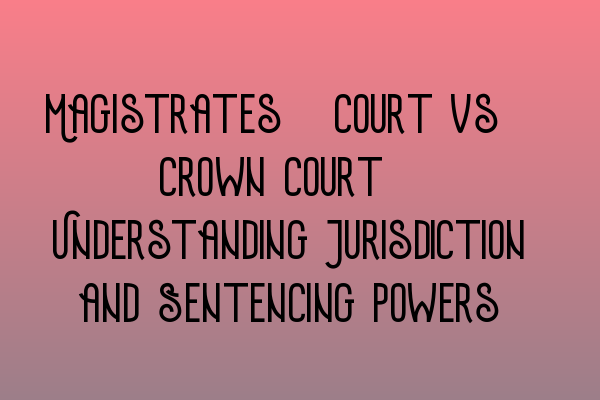Magistrates’ Court vs. Crown Court: Understanding Jurisdiction and Sentencing Powers
In the United Kingdom, two primary courts handle criminal cases: the Magistrates’ Court and the Crown Court. Understanding the jurisdiction and sentencing powers of each court is crucial in ensuring a fair legal process and achieving the best possible outcome for defendants.
The Magistrates’ Court: A Summary
The Magistrates’ Court, also known as the lower court, deals with the majority of criminal cases in England and Wales. This court has the authority to handle less serious offenses, such as minor assaults, theft, and traffic violations. Cases that require a more in-depth investigation or involve more serious offenses are usually referred to the Crown Court.
The Magistrates’ Court is presided over by magistrates, who are not qualified lawyers but are trained to interpret and apply the law. They receive guidance from a legal adviser during proceedings. In certain cases, a panel of three magistrates or a District Judge may make decisions.
Generally, the Magistrates’ Court handles cases where the defendant pleads guilty or if the offense carries a maximum prison sentence of less than six months. This court also conducts initial hearings for more serious offenses before referring them to the Crown Court. Moreover, the Magistrates’ Court has the power to grant bail and issue fines and community sentences.
If you are preparing for the SQE 1 examination and want to practice cases related to the Magistrates’ Court, we highly recommend our SQE 1 Practice Exam Questions. It provides comprehensive practice questions to hone your skills and knowledge.
The Crown Court: A Summary
The Crown Court deals with more serious and complex criminal cases. It is presided over by a trained judge or a panel comprising a judge and a jury. This court has the authority to hear cases referred from the Magistrates’ Court for trial and cases that involve indictable offenses.
Indictable offenses are the most serious crimes, such as murder, robbery, and serious sexual offenses. The Crown Court is responsible for conducting trials, scrutinizing evidence, and ensuring a fair legal process. If a defendant pleads guilty in the Crown Court, the court is responsible for determining the appropriate sentence.
The Crown Court has greater sentencing powers compared to the Magistrates’ Court. It can impose longer prison sentences, issue life sentences for the most severe offenses, and handle appeals from the Magistrates’ Court. Additionally, this court deals with cases of significant public interest and cases that require a jury to determine guilt or innocence.
If you want to prepare for the SQE 1 or SQE 2 examinations and require comprehensive practice mocks and quizzes, our SQE 1 Practice Mocks FLK1 FLK2 are ideal for assessing your knowledge and improving your performance.
Which Court is Right for Your Case?
When determining which court is suitable for your case, it is essential to consult with a knowledgeable criminal defense solicitor. They can assess the severity of the offense, analyze the evidence, and provide sound legal advice about which court is most appropriate.
If you are looking for expert guidance and preparation for the SQE 1 or SQE 2 examinations, explore our comprehensive SQE 1 Preparation Courses and SQE 2 Preparation Courses. Our programs are designed to equip you with the necessary skills and knowledge to excel in these exams and embark on a successful legal career.
Stay up to date with the latest SRA SQE Exam Dates by visiting our article: SRA SQE Exam Dates.
Remember that a strong defense strategy and proper understanding of the court system can significantly impact the outcome of your case. Whether your case is handled in the Magistrates’ Court or the Crown Court, having experienced legal representation is vital to protect your rights and ensure a fair trial.
